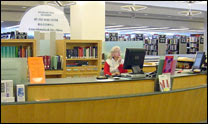Do you know about the Fakebooks page on the Art, Music and Recreation Center home page?
It features a database for the Library's extensive collection of Fake books. The Harvard Dictionary of Music provides a snooty but fairly accurate definition of a fake book:
A collection of popular and jazz melodies with chord symbols (often rudimentary or simply incorrect) and sometimes words, used especially by musicians in restaurants, nightclubs, and the like as a basis from which to improvise or "fake" their own arrangements.
A classic jazz combo often uses a melody as the "head" or introduction to their improvisation over the chord structure of the melody. Fake books played a role in enshrining certain melodies as "standards," often popular melodies or show tunes. (If you are interested in learning more, check out Ted Gioia's The Jazz Standards: A Guide to the Repertoire).
The earliest fake books were created without copyright clearance and did contain inaccuracies. By the 1970s music publishers were creating their own "legal" or "legitimate" fake books to meet musicians' demands.
Here are examples using the standard "I Get A Kick Out Of You."
The familiar chorus appears half-way down the page and includes the words as well.
"I Get A Kick Out of You" takes up 5 pages in a songbook. The Just Standards Real Book presents it in 2 pages while in The Book it fills up only two thirds of a page.
Although both fake books present the song in the same key, a discerning musician will see small differences in the melody and the chord changes. These variations demonstrate why it's important to have a variety of fake books in our collection.
Fake books are in no way limited to jazz. There are folk, gospel, country, blues, Broadway, classical, and many other kinds of fake books. They are often used by musicians who busk, who play at receptions, in hotel lobbies, at restaurants or in any background capacity. And, of course, by any musicians who just want to "jam." They allow a musician to carry a great deal of notated musical information in a condensed form.
A standard fake book is considered to be in "C" – in non-transposed keys playable by "C" instruments like piano, guitar, violin and flute. There are also "Bb" fake books used by trumpet and tenor sax players, "Eb" fake books used by alto and baritone sax players, and bass clef fake books used by trombonists and string bass players.
Our Fakebook Index is built on an Access database where we include the title, the last name of the composer (often both songwriter and lyricist), and the title of the corresponding fakebook. It does not follow a keyword standard but instead searches for continuous strings of text of any length. You could look up the song above with "Porter" as a last name or with the full title or part of the title. You can also look up the name of a collection to view its contents.
We own reference copies of all of the fakebooks, but we also have circulating copies of many of them.
Fakebooks are often used by sophisticated musicians and sometimes sophisticated musicians have sophisticated needs. Please contact us in the Art, Music & Recreation Center if you need additional help.




